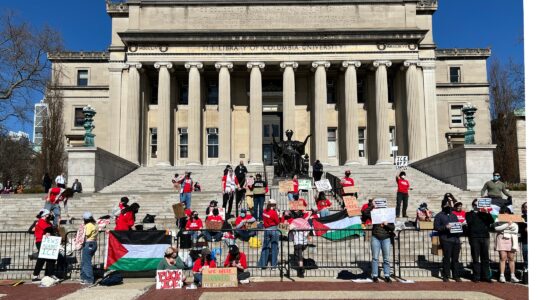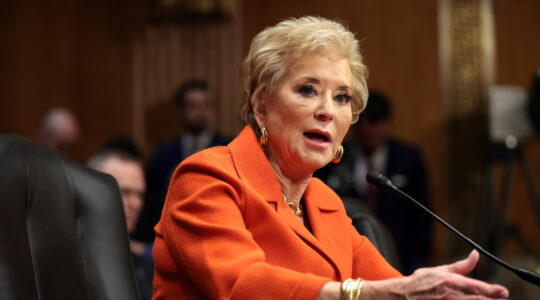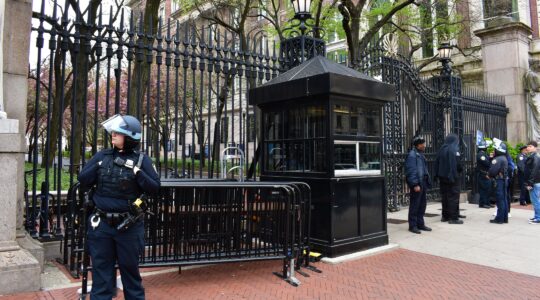WASHINGTON (JTA) — Jewish groups expressed disappointment in a U.S. Supreme Court decision expanding gun owners’ rights and differed on another decision upholding a university’s right to ban discriminatory groups.
In a 5-4 decision, the court on Monday limited the rights of cities and states to restrict gun ownership. The Anti-Defamation League and the National Council of Jewish Women each filed a friend-of-the-court brief in the case of McDonald v. City of Chicago.
A similar decision last year, involving the District of Columbia, was seen as applying only to federally controlled areas, and this decision was closely watched because its implications were broader. Observers who had hoped that conservative justices might see states’ rights as trumping their broad interpretation of Second Amendment rights were disappointed.
"Today’s Supreme Court decision limiting the rights of states to regulate firearms is a disappointing setback in the fight against extremism and violence," ADL said in a statement. "We deeply regret that the Court has restricted the latitude that cities and states retain to keep guns out of the hands of extremists, terrorists and violent bigots. The decision makes America a less safe place for law enforcement officers and the communities they protect."
NCJW and the Reform movement’s Religious Action Center also expressed "disappointment" in the ruling.
"Whenever sensible gun control laws are struck down, it is a disappointment," said Rabbi David Saperstein, the RAC’s director.
In the case of Christian Legal Society v. Martinez, the court ruled 5-4 that the University of California Hastings Law School, which receives federal funding, may reject official status for a group that discriminates on a religious basis.
Five Jewish groups — the American Jewish Committee, ADL, the Union for Reform Judaism, NCJW and the Jewish Council for Public Affairs — had joined friend-of-the-court briefs backing the university.
"Today’s Supreme Court decision reaffirms long-standing precedents that state and local governments can and should prohibit the use of taxpayer-supported public funding to organizations and groups that restrict their membership," the JCPA said in a statement. "This is another step forward in ending these practices. As Jews, we believe that all humans, regardless of race, religion or sexuality, are created in the divine image."
The Christian Legal Society would not extend its membership to students in gay relationships.
Three Orthodox Jewish groups, the Orthodox Union, the National Council of Young Israel and Agudath Israel of America, had filed briefs friendly to the society, partly out of concerns that a ruling against the group would inhibit the establishment of Jewish student societies.
"If the First Amendment guarantees anything, it guarantees the right of people of faith to associate and join in expressions of faith without state interference and without the state placing a burden on their religious activities," the OU said in a statement.
The JCPA, a consensus-driven umbrella group for Jewish policy organizations, recognized such views in its statement.
"Some Jewish groups feel that the Free Exercise rights of religious groups should include a right to admit or hire without regard to anti-discrimination provisions," it said. "JCPA deeply respects this concern, as well as a strong application of the Free Exercise clause. However, JCPA also believes where government funds are involved, we are called to ensure a non-discriminatory educational environment."
The rulings came on the last day of this Supreme Court session, and the last day that Justice John Paul Stevens, 90, would serve.
Elena Kagan, the Obama administration’s solicitor general and President Obama’s nominee to replace Stevens, started her confirmation hearings in the U.S. Senate on Monday. She would be the second Jewish woman to join the court, following Ruth Bader Ginsburg, who is still serving.
Jewish groups expressed condolences to Ginsburg upon the death Sunday of her husband, Martin. A tax lawyer and Georgetown University professor, Martin Ginsburg was known for his devotedness to his wife; he divested himself of a number of retirement accounts so she could rule impartially in cases.
JTA has documented Jewish history in real-time for over a century. Keep our journalism strong by joining us in supporting independent, award-winning reporting.





